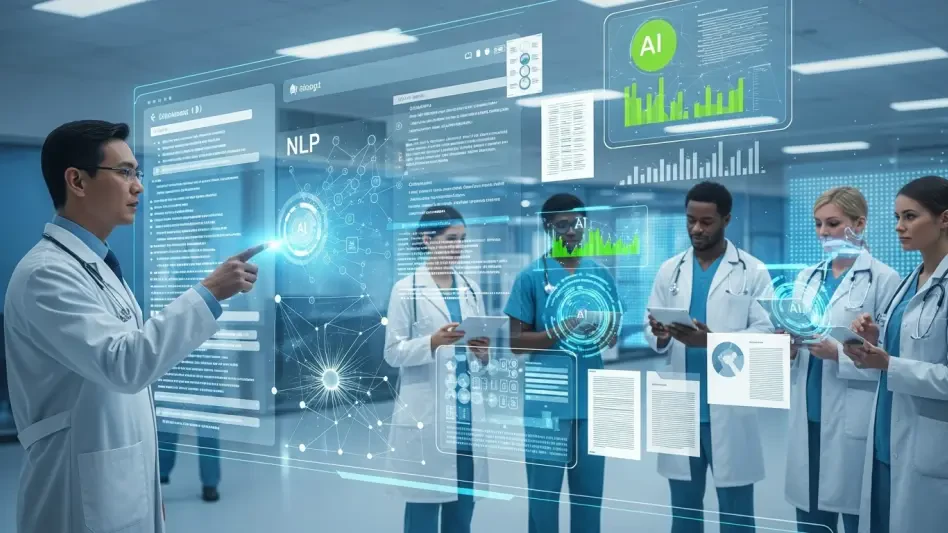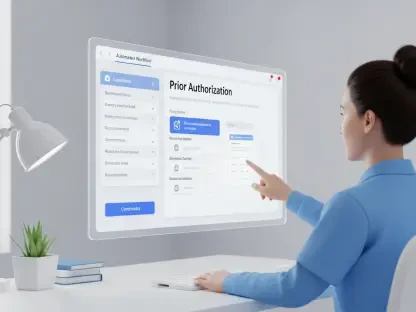In an era where healthcare systems grapple with an overwhelming deluge of unstructured data—think millions of clinical notes, patient records, and genomic sequences—AI-powered Natural Language Processing (NLP) emerges as a game-changing solution that is revolutionizing how medical professionals operate. This technology, capable of deciphering and extracting meaningful insights from vast, disorganized datasets, is transforming decision-making processes in the medical field. Imagine a world where a clinician can cut documentation time by a significant margin, or a researcher can predict drug responses based on genetic data in mere hours. This article aims to address the most pressing questions surrounding NLP’s role in healthcare and life sciences, offering clear insights into its applications, benefits, and investment potential. Readers can expect to explore how this innovation tackles real-world challenges, enhances patient outcomes, and opens doors for strategic growth in a rapidly evolving sector.
The scope of this discussion spans critical areas such as clinical decision support, genomics, and the market dynamics driving NLP adoption. Key questions will unpack the technology’s transformative impact, from streamlining hospital workflows to accelerating personalized medicine. By delving into specific examples and evidence, this FAQ seeks to provide actionable understanding for stakeholders, whether they are healthcare providers, researchers, or investors looking to navigate this promising landscape.
Key Questions
What Is AI-Powered NLP and Why Does It Matter in Healthcare?
AI-powered NLP refers to the use of artificial intelligence to process and analyze human language, particularly in unstructured formats like text or speech, within specialized contexts such as healthcare. Its significance lies in addressing a longstanding challenge: the sheer volume of data in medical settings that remains untapped due to its disorganized nature. From physicians’ notes to radiology reports, much of this information holds critical insights that can improve patient care if properly harnessed.
The importance of NLP becomes evident when considering the inefficiencies it resolves. For instance, manual documentation burdens clinicians with hours of administrative work, diverting attention from patient interaction. By automating the extraction of relevant details from these records, NLP not only saves time but also reduces errors, ensuring that healthcare providers can focus on delivering quality care. This technology acts as a bridge between raw data and actionable knowledge, making it indispensable in modern medical environments.
Evidence of its impact is striking, with systems integrating advanced NLP models demonstrating a reduction in documentation time by up to 30%. Such efficiency translates into substantial cost savings for healthcare institutions and improved job satisfaction for staff, underlining why this innovation is a cornerstone for the future of the industry.
How Does NLP Enhance Clinical Decision Support Systems?
Clinical Decision Support (CDS) systems are designed to assist healthcare professionals in making informed choices by providing evidence-based recommendations at the point of care. NLP enhances these systems by processing vast amounts of unstructured clinical data—such as patient histories or lab results—and converting it into structured insights that can guide diagnosis and treatment. This capability is crucial in environments where quick, accurate decisions can mean the difference between life and death.
A practical example lies in the integration of sophisticated NLP tools into electronic health record (EHR) platforms. These tools can analyze clinical notes in real time, flagging potential issues like drug interactions or missed diagnoses before they escalate. Such proactive assistance empowers clinicians to act swiftly, improving patient safety and operational efficiency across hospitals and clinics.
The measurable outcomes of this technology are compelling, with reports indicating a significant decrease in unnecessary treatments when NLP-driven CDS systems are employed. This not only optimizes resource allocation but also ensures that patients receive interventions tailored to their specific needs, highlighting the profound operational benefits of this approach.
What Role Does NLP Play in Genomics and Personalized Medicine?
Genomics, the study of an individual’s genetic makeup, is a frontier in personalized medicine, aiming to tailor treatments based on unique genetic profiles. NLP plays a pivotal role by decoding complex genomic data and linking it to clinical outcomes, enabling researchers to predict how patients might respond to specific drugs or therapies. This intersection of technology and biology is reshaping how diseases are understood and managed.
Consider the challenge of analyzing genetic mutations buried within extensive datasets. NLP-powered tools can sift through this information, identifying patterns and correlations that inform drug development and therapeutic strategies. Companies leveraging such capabilities have reported shorter timelines in drug discovery, accelerating the journey from lab to patient bedside.
Real-world evidence further supports this impact, with studies showing a 20% increase in the success rate of targeted therapies when NLP is used to guide genomic analysis. This precision not only enhances treatment efficacy but also paves the way for groundbreaking advancements in combating conditions like cancer or rare genetic disorders, making it a vital area of focus.
Who Are the Major Players Driving NLP Innovation in Healthcare?
The landscape of NLP in healthcare is shaped by both established tech giants and agile startups, each contributing distinct strengths to the field. Large corporations, with their extensive resources and infrastructure, are at the forefront of integrating NLP into mainstream healthcare solutions. Their partnerships with EHR vendors and focus on cloud-based platforms ensure widespread adoption and scalability.
For instance, certain industry leaders have developed advanced models that combine genomic data, imaging, and clinical notes to improve diagnostic accuracy. These multimodal approaches have yielded tangible results, such as enhanced precision in identifying conditions that might otherwise go undetected. Their dominance in the market offers stability for stakeholders seeking reliable, long-term solutions.
On the flip side, emerging companies are carving out niches by pushing boundaries in specialized areas like genomic analysis and drug efficacy prediction. While these entities carry higher risks due to regulatory and scaling challenges, their innovative platforms often outpace larger competitors in specific applications, presenting unique opportunities for growth and differentiation in a competitive arena.
What Are the Investment Opportunities and Challenges with NLP in Healthcare?
The investment potential in NLP for healthcare is immense, with market projections estimating exponential growth over the next decade, reaching staggering figures by 2034. Opportunities abound in two primary avenues: partnering with established tech leaders for predictable, subscription-based returns, or backing innovative startups that target niche challenges with high-growth potential. This dual pathway allows investors to balance risk and reward based on their strategic goals.
However, navigating this space is not without hurdles. Regulatory compliance remains a significant barrier, as evolving guidelines around data usage and AI adoption must be meticulously followed to avoid legal pitfalls. Additionally, the sensitivity of patient information demands robust cybersecurity measures, such as end-to-end encryption, to protect against breaches that could undermine trust and financial viability.
Despite these challenges, the outlook remains optimistic, with regulatory tailwinds creating a more favorable environment for compliant solutions. Investors who prioritize partnerships with entities demonstrating strong data security and adherence to standards are likely to see substantial returns as adoption accelerates across the sector, making strategic foresight essential.
Summary
AI-powered NLP stands as a transformative force in healthcare and life sciences, addressing critical pain points like unstructured data overload and enabling precision in clinical and genomic applications. Key insights reveal its profound impact on clinical decision support, where it streamlines workflows and reduces errors, and in genomics, where it drives personalized medicine through targeted insights. The market is led by tech giants offering stability and startups providing innovative, high-risk opportunities, while investment prospects are tempered by regulatory and security considerations.
The implications for stakeholders are clear: embracing NLP can yield operational efficiencies, improved patient outcomes, and significant financial returns. For those eager to dive deeper, exploring resources on AI in healthcare or industry reports on genomic advancements can provide further clarity on trends and opportunities shaping this dynamic field.
Final Thoughts
Reflecting on the journey through the transformative potential of AI-powered NLP, it becomes evident that this technology has already begun to redefine healthcare and life sciences in profound ways. The strides made in enhancing clinical decisions and personalizing treatments through genomics underscore a shift that is both necessary and inevitable. These advancements have laid a foundation for a future where data no longer overwhelms but empowers.
Looking ahead, stakeholders are encouraged to take actionable steps, such as evaluating partnerships with proven technology providers or investing in emerging solutions that align with regulatory frameworks. Prioritizing data security and staying abreast of evolving policies can further solidify positions in this burgeoning market. As the landscape continues to evolve, proactive engagement with these innovations promises not just adaptation but leadership in shaping the next era of medical excellence.









